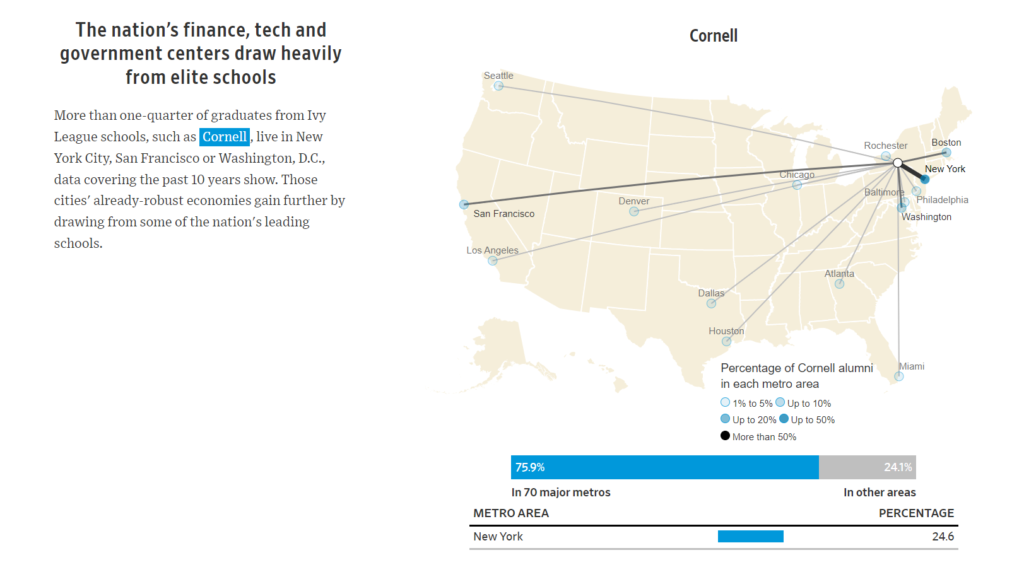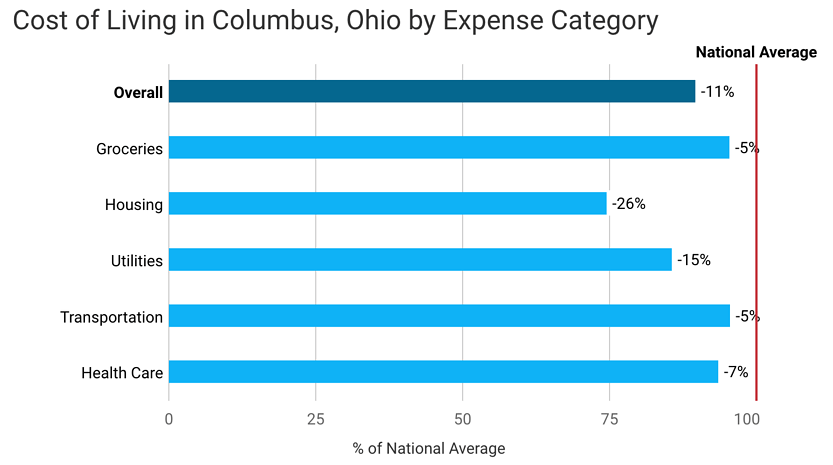
“Where should I move after college?” this is a burning question for every college graduate. “Should I move back home, go to grad school, or move to a big city and pursue a career in a large corporation?” Depending on your major and life goals, you may find various destinations more or less appealing. Perhaps, another metro area you’ve never considered has many attractive job and housing opportunities. Let’s take a look at the best locations recommended to college graduates.
Most commonly, students consider the following factors when they think about the places to move after college:
- Job availability
- Unemployment rate
- Median rent and overall housing situation
- The overall cost of living
- Student loan forgiveness program availability
- The size of the young-adult population
- Etc.
Where to Move after College?
Recent college graduates are not experienced workers; therefore, they can’t expect huge wages at the beginning of their career path. According to the U.S. Census Bureau, before the pandemic, their median income used to be around $40,000. The rate of unemployment was reportedly 3.4% in 2019. Indeed, college graduates usually have fewer problems during the economic crisis than workers without a bachelor’s degree. Still, the unemployment rate in this group has also increased in the past two years. Besides, student loan debt is a reality for the majority of college grads, so making a careful choice of the future job location is essential for many reasons.
It is only natural to think about staying in one of the big cities after graduation, as all sorts of job and recreation opportunities are usually there. Many students do move to big metropolitan areas, but there are also those who choose to move to smaller communities. You can check the Wall Street Journal for more details. Here is the screenshot from their article that describes where graduates from Ivy League schools prefer to move:

However, with the median income we’ve mentioned, living in a big metropolitan area may be a challenge for many students and especially for those with a student loan to pay off. While New York is exceedingly attractive (the top destination, to be precise, according to the aforementioned Wall Street Journal), in reality, it offers few entry-level positions, and the rent is extremely high there. At the same time, smaller cities (e.g., Detroit or Austin) have more affordable housing and a richer job market.
Best Cities to Move to after College
We’ve gone through various resources that studied the movements of recent college graduates in the past few years and have compiled a shortlist of 5 cities that you may consider if you are about to graduate.
Baltimore, MD
| Median Rent: | $972 |
| Unemployment Rate: | 7.4% |
| Population Aged 20-24: | 6.8% |
| Student Loan Repayment Programs | State and federal programs; amounts vary |
If finance, defense, or information technology are your major, Baltimore has a lot to offer. Such companies as Constellation Energy Group (CEG), Lockheed Martin Corporation (LMT), and Grant Thornton International have offices here. Also, if you want to live in a place with both waterfront and downtown areas and a vibrant music scene, Baltimore is a great choice.
- Pros: The rent and cost of living are relatively low compared to other big cities; good transportation system; safety.
- Cons: Long time to commute from the suburbs if you don’t have a car; some of the neighborhoods are still notorious for their crime rate.
Seattle, WA
| Median Rent: | $942 |
| Unemployment Rate: | 9.2% |
| Population Aged 20-24: | 6.7% |
| Student Loan Repayment Programs | Up to $35,000/yr, healthcare sector; federal programs |
The next recommendation on our list is Seattle. This is a place to go if you don’t mind short summers and cold, wet, and cloudy winters and are looking for a job in an information technology sector or a position related to life sciences, trade, transportation, business services, health care, utilities, and education. The city also hosts the headquarters of several major corporations (e.g., Starbucks, Amazon, Microsoft, etc.). Many Seattle businesses open new positions every year, so recent college graduates have more chances to get a quick start here. Besides, the rent runs below $1,000 on average, so you can have the rest of your pay to cover your student loans and enough to pursue cultural life in the city.
- Pros: Many startups; high job growth rates; affordable rent; relatively low crime rate; amazing scenery (mountains and the ocean).
- Cons: The weather (as we’ve already mentioned, you have to like overcast and cloudy days a lot); parking is a challenge.
Nashville, TN
| Median Rent: | $841 |
| Unemployment Rate: | 2.3% |
| Population Aged 20-29: | 18.1% |
| Student Loan Repayment Programs | NO state student loan forgiveness programs; only federal programs |
Nashville is definitely your first destination if music is a part of your life and you prefer to live and work in a place where you can get it in abundance. Besides, the city’s job scene includes offers from such corporations as Nissan North America, Randstad, and General Motors as well as from Vanderbilt University. One more reason to consider Nashville is the housing price, as you can easily find apartments under $1,000 per month.
- Pros: Unbeatable music and nightlife scene; plenty of job opportunities; plenty of housing opportunities; great food; mild winters.
- Cons: Public transport is limited, you’ll need a car; severe traffic; the weather is hot and humid, especially in summer.
Albany, NY
| Median Rent: | $841 |
| Unemployment Rate: | 2.3% |
| Population Aged 20-29: | 18.1% |
| Student Loan Repayment Programs | Programs and amounts vary |
If you want to live and work in New York but are afraid that you won’t be able to afford it, consider Albany. What is great about Albany is that it’s just two and a half hours from New York, but the job market is thriving, and the unemployment rate is really low here. Besides, there are many young people working in education and computer tech. We highly recommend this capital city of New York State as an option to consider for all recent college graduates. Surely the city is not as large as New York, but it has its perks in terms of recreation. If you prefer parks, hiking, and biking to cafes and nightlife, this is definitely a place for you.
- Pros: Low cost of living; affordable rent; plenty of job opportunities; great location; plenty of recreational opportunities; beautiful nature.
- Cons: Penty of derelict property, severe traffic; lack of parking downtown; harsh winters.
Columbus, OH
| Median Rent: | $724 |
| Unemployment Rate: | 1.5% |
| Population Aged 20-29: | 19.7% |
| Student Loan Repayment Programs | State programs for Ohio residents; $25,000-$50,000 |
According to SmartAsset’s “fifth annual edition of the best cities for college grads” that analyzed the best locations for recent college grads based on job availability, housing affordability, and entertainment opportunities, Columbus scored among the top three. Besides, it is also the place with the highest rate of young population, which makes it perfect for recent college graduates. There are plenty of state-related jobs and many booming industries; it is also an ideal location for those who work in tech.
Check the chart depicting the overall cost of living in Columbus compared with the national average provided by Payscale:

- Pros: Affordable cost of living; relatively low unemployment rate; beautiful nature; change of seasons.
- Cons: High traffic; Columbus comes third in terms of bad weather after Seattle and Cleveland; high levels of radon gas.
The Bottom Line
In this article, we’ve tried to cover the most popular locations that have already been mentioned many times in various reports and studies. We understand that all college graduate students pursue different career goals and have different ideas of an ideal location. However, there are a few things most students can’t ignore: affordable housing and plenty of job opportunities.
Therefore, we’ve attempted to single out the best locations with regard to these primary factors of interest plus a few other factors such as the overall cost of living, the percentage of the population aged 20 to 29, the unemployment rate, access to public transportation, and access to cultural, recreational, and entertainment opportunities.
Besides, for many college grads, the choice of their future job location is closely connected with the potential ability to pay off student loans quickly. So while you may have been dreaming about moving to New York all your life, at the start of your career, you may also consider a place with a more favorable combination of local income levels and local costs of living as well as student loan forgiveness offers. After living and working somewhere else for a while you’ll be able to pay off your student loan faster and move to New York without any liabilities.
Surely we don’t suggest choosing your future job location based solely on the factors of relatively good income, student loan forgiveness possibility, or low rent if the place doesn’t appeal to you at all. After all, there can be strings attached in the form of hidden costs such as high property tax (e.g., New Jersey ), high income and sales tax (e.g., Tacoma, WA), etc. Therefore, we strongly recommend that you consider all the factors, but please, don’t send yourself into exile just because a good job offer is in a place you can’t imagine living in.




